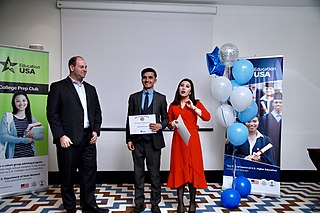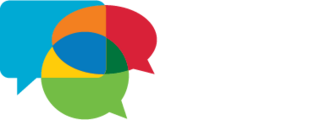
The United States Department of State (DOS), or simply the State Department, is an executive department of the U.S. federal government responsible for the country's foreign policy and relations. Equivalent to the ministry of foreign affairs of other nations, its primary duties are advising the U.S. president on international relations, administering diplomatic missions, negotiating international treaties and agreements, and representing the U.S. at the United Nations. The department is headquartered in the Harry S Truman Building, a few blocks from the White House, in the Foggy Bottom neighborhood of Washington, D.C.; "Foggy Bottom" is thus sometimes used as a metonym.
The Fulbright Program, including the Fulbright–Hays Program, is one of several United States Cultural Exchange Programs with the goal of improving intercultural relations, cultural diplomacy, and intercultural competence between the people of the United States and other countries through the exchange of persons, knowledge, and skills. Via the program, competitively-selected American citizens including students, scholars, teachers, professionals, scientists, and artists may receive scholarships or grants to study, conduct research, teach, or exercise their talents abroad; and citizens of other countries may qualify to do the same in the United States.

Academic mobility refers to students and teachers in higher education moving to another institution inside or outside of their own country to study or teach for a limited time.

A student exchange program is a program in which students from a secondary school or higher education study abroad at one of their institution's partner institutions. A student exchange program may involve international travel, but does not necessarily require the student to study outside their home country.
International education refers to a dynamic concept that involves a journey or movement of people, minds, or ideas across political and cultural frontiers. It is facilitated by the globalization phenomenon, which increasingly erases the constraints of geography on economic, social, and cultural arrangements. The concept involves a broad range of learning, for example, formal education and informal learning. It could also involve a reorientation of academic outlook such as the pursuit of "worldmindedness" as a goal so that a school or its academic focus is considered international. For example, the National Association of State Universities prescribes the adoption of "proper education" that reflects the full range of international, social, political, cultural, and economic dialogue. International educators are responsible for "designing, managing, and facilitating programs and activities that help participants to appropriately, effectively, and ethically engage in interactions with culturally diverse people and ideas."

Established on February 27, 1977, the Fulbright Association is a private, nonprofit organization whose members are Fulbright Program alumni and friends of international education. The association supports and promotes international educational and cultural exchange and the ideal most associated with the Fulbright name—mutual understanding among the peoples of the world.
For over 60 years, the Council for International Exchange of Scholars (CIES) has helped administer the Fulbright Scholar Program, the U.S. government's flagship academic exchange effort, on behalf of the United States Department of State, Bureau of Educational and Cultural Affairs. Founded in 1947, CIES is a private organization with a staff of around 60 people supplemented by 300 voluntary peer reviewers, primarily academics. CIES is a division of the Institute of International Education (IIE).

The Experiment in International Living, or The Experiment, is a worldwide program offering homestays, language, arts, community service, ecological adventure, culinary, and regional and cultural exploration programs of international cross-cultural education for high school students. It is administered by World Learning, a non-profit, international development and education organization based in Brattleboro, Vermont, in the United States.

EducationUSA is a US Department of State network of international student advising centers in more than 170 countries. Officially a branch of the Office of Global Educational Programs, a part of the Bureau of Educational and Cultural Affairs (ECA), the ECA fosters mutual understanding between the United States and other countries by promoting personal, professional, and institutional ties between private citizens and organizations in the United States and abroad, as well as by presenting U.S. history, society, art and culture to overseas audiences.

The Institute of International Education (IIE) is a 501(c) organization that focuses on international student exchange and aid, foreign affairs, and international peace and security. IIE creates programs of study and training for students, educators, and professionals from various sectors. The organization says its mission is to "build more peaceful and equitable societies by advancing scholarship, building economies, and promoting access to opportunity".
NAFSA: Association of International Educators is a non-profit professional organization for professionals in all areas of international education including education abroad advising and administration, international student advising, campus internationalization, admissions, outreach, overseas advising, and English as a Second Language (ESL) administration. As of 2010, it served approximately 10,000 educators worldwide, representing nearly 3,000 higher education institutions.
Work abroad is the term used when a student teaches, interns, or volunteers in a foreign country through a programme. Students gain work experience while being immersed in a foreign work environment, though the position may be paid or unpaid. Dependent upon the programme, a student working abroad may live in a dormitory or apartment with other students or with a "host family", a group of people who live in that country and agree to provide student lodging.

The US-UK Fulbright Commission was created by a treaty signed by the United Kingdom and the United States on 22 September, 1948. It is a non-profit organisation based in London, UK. It aims to foster mutual cultural understanding through educational exchange between both nations. Fulbright helps students, scholars and professionals interested in studying abroad in the US or UK through its scholarship programme and its EducationUSA advice service.

The National Security Language Initiative (NSLI) is a program introduced by United States President George W. Bush on January 5, 2006 at the U.S. University President's Summit to develop the foreign language skills of American high school students, especially in "critical-need" foreign languages such as Arabic, Mandarin Chinese, Russian, Hindi, and Persian. The initiative was given $114 million in fiscal year 2007 and $26.6 million in 2008 to expand programs from kindergarten level to universities. Schools were additionally awarded $750 million for critical language education.

World Learning is a 501(c)(3) international nonprofit organization that focuses on international development, education, and exchange programs. Based in Brattleboro, Vermont, World Learning "unlocks the potential of people to address critical global issues" through its core program areas: The Experiment in International Living, the School for International Training, and International Development and Exchange Programs.
The US–China Education Trust is a non-profit organization based in Washington D.C. Founded in 1998 by Ambassador Julia Chang Bloch, the first Chinese-American U.S. Ambassador, USCET seeks to promote China–United States relations through a series of education and exchange programs. The organization sponsors a variety of fellowships, conferences, workshops and exchanges, focused primarily on strengthening Chinese academic institutions related to the fields of American Studies, Media and Journalism, American Governance, and International Relations.
United States cultural exchange programs, particularly those programs with ties to the Bureau of Educational and Cultural Affairs (ECA) of the United States Department of State, seek to develop cultural understanding between United States citizens and citizens of other countries. Exchange programs do not necessarily exchange one individual for another individual of another country; rather, "exchange" refers to the exchange of cultural understanding created when an individual goes to another country. These programs can be regarded as a form of cultural diplomacy within the spectrum of public diplomacy.
The Commission for Educational Exchange between the United States of America, Belgium, and Luxembourg is located in Brussels, Belgium, with the office situated at the Royal Library Albert I. It is a not-for profit organization that is responsible for administering Fulbright grants for citizens of Belgium and Luxembourg. It also serves as the EducationUSA Advising Center in Belgium.
The Congressional International Exchange and Study Caucus is a caucus of the United States Congress that aims to raise awareness of the importance and benefits of international exchange and study abroad programs, which enable international citizens to have meaningful exchange experiences in the United States, and Americans to have such beneficial experiences in other countries. It is co-chaired in the 114th Congress by Representatives Steve Pearce of New Mexico and Jim Himes of Connecticut.
William L. Gertz is the Chairman, President and CEO of the American Institute For Foreign Study (AIFS), a cultural exchange and educational travel company with 10 global locations, headquartered in Stamford, CT.









